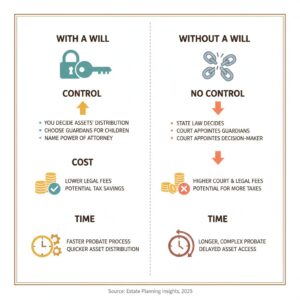We all spend our lives building something: a home, a career, a family. We work hard to create a legacy. But what happens to everything we’ve built if we can no longer make decisions, or after we are gone?
This is where estate planning comes in. It’s not just for the wealthy. It’s for everyone. It helps us protect our loved ones and ensure our wishes are followed.
An estate plan is our personal blueprint for the future. It clearly states who gets our assets. It names guardians for our children. It provides for us if we become unable to manage our own affairs. Without one, the law decides these important matters for us. This can lead to stress, delays, and costs for our families.
In this extensive guide, we will explore what an estate plan is. We will break down its essential parts. We will show you how it protects our family, minimizes taxes, and provides peace of mind. We will also cover common mistakes and how to avoid them.

Estate planning is often misunderstood as a concern only for the elderly or the ultra-rich. However, it is, in fact, a crucial process for anyone over the age of 18. It’s about creating a comprehensive strategy to manage your financial and personal affairs, not just after your death, but also during your lifetime in the event of incapacitation. This proactive approach ensures that your voice is heard and your wishes are honored, even when you cannot speak for yourself.
What is an Estate Plan?
At its core, an estate plan is a set of legal instructions that define how your assets will be preserved, managed, and distributed during your lifetime and after your passing. It’s your personal rulebook, carefully detailing who will receive your property, who will make decisions on your behalf if you’re unable, and how your loved ones will be cared for.
Let’s break down the key components:
- Defining Your Estate: Your “estate” encompasses everything you own (your assets) and everything you owe (your liabilities). Assets can include tangible items like real estate, vehicles, jewelry, and personal belongings, as well as intangible assets such as bank accounts, investment portfolios, life insurance policies, retirement funds, digital assets, and business interests. Liabilities include mortgages, loans, credit card debt, and any other financial obligations.
- Your Assets: These are the building blocks of your legacy. A thorough inventory of all your assets is the first step in effective estate planning. This includes understanding their value, location, and how they are titled (e.g., solely owned, joint tenancy, community property).
- Your Liabilities: Just as important as your assets, your debts must also be accounted for. When you pass away, your debts must typically be paid from your estate before assets can be distributed to your beneficiaries. Planning for these can prevent unexpected burdens on your loved ones.
- A Set of Instructions: An estate plan is essentially a detailed instruction manual. It dictates who will manage your finances and make medical decisions if you become incapacitated, who will inherit your assets, and who will be responsible for administering your estate.
- Not Just for the Wealthy: This is a critical point we cannot emphasize enough. While those with significant wealth might face complex tax considerations, everyone benefits from an estate plan. Without one, state laws of intestacy will determine how your assets are distributed, and a court will appoint guardians for minor children and administrators for your estate. This often leads to outcomes that do not align with your personal wishes, causing unnecessary stress, expense, and potential conflict for your family. The statistics underscore this reality: despite 60% of Americans considering estate planning important, only 35% have a will or trust in place. This means a significant portion—around 65%—are leaving critical decisions about their future and their loved ones’ well-being to chance.
The Critical Importance of Planning Ahead
The decision to create an estate plan is a profound act of love and responsibility. It’s about taking control and providing clarity during what can be an incredibly difficult time for your family.
- Controlling Your Legacy: An estate plan ensures that your hard-earned assets are distributed according to your explicit wishes. Do you want to leave a specific heirloom to a grandchild? Do you want to support a particular charity? A well-crafted plan makes sure these intentions are honored.
- Protecting Loved Ones: Beyond assets, estate planning protects the people who matter most. It designates guardians for minor children, ensuring they are raised by individuals you trust and who share your values. It can also establish provisions for adult dependents with special needs, safeguarding their future without jeopardizing government benefits.
- Designating Guardians: For parents of minor children, this is arguably one of the most compelling reasons to create a will. Without a designated guardian, a court will decide who raises your children, a decision that may not reflect your preferences or the best interests of your family.
- Avoiding Family Conflict: Money and grief can be a volatile combination. Clear instructions in an estate plan can prevent disputes among family members over inheritances, guardian appointments, or medical decisions. It removes ambiguity and provides a roadmap for your loved ones to follow.
- Minimizing Court Intervention: Without an estate plan, your estate will likely go through probate – a public, often lengthy, and expensive court process. This process can tie up assets for months or even years, delaying distributions to your beneficiaries and incurring significant legal and administrative fees.
- State Intestacy Laws: If you die without a valid will or trust, you are said to have died “intestate.” In such cases, state law dictates how your assets are distributed, often following a rigid formula that prioritizes certain family members (e.g., spouse, children, parents) regardless of your personal relationships or wishes. This means a beloved partner might be left out, or assets could go to estranged relatives.

This infographic illustrates the stark differences in control, cost, and time when an estate is managed with or without a proper plan.
The Core Documents: Building Your Estate Plan Foundation

Building a robust estate plan involves several foundational legal documents, each serving a distinct but interconnected purpose. These documents work in concert to ensure your wishes are carried out comprehensively.
The Last Will and Testament
Often the cornerstone of an estate plan, a Last Will and Testament is a legal document that outlines your wishes for the distribution of your property after your death. It comes into effect only upon your passing and is subject to the probate process.
- Appointing an Executor: Your will names an executor (sometimes called a personal representative), the individual or institution responsible for administering your estate. Their duties include identifying and gathering your assets, paying your debts and taxes, and distributing the remaining assets to your beneficiaries as specified in your will. Choosing a trustworthy, organized, and willing executor is paramount.
- Naming Guardians for Minors: For parents, a will is the primary document used to designate legal guardians for minor children. This ensures that if both parents pass away, children are cared for by individuals chosen by you, rather than by a court.
- Distributing Property: This is where you specify who inherits your assets—whether it’s specific items, percentages of your estate, or residual property. Without a will, state intestacy laws will govern this distribution, potentially leading to unintended outcomes.
- Public Record: Once a will enters probate, it becomes a public document, meaning its contents are accessible to anyone.
- Probate Process: Probate is the legal process through which a will is validated, an executor is appointed, assets are inventoried, debts and taxes are paid, and remaining assets are distributed. While necessary for wills, probate can be time-consuming, costly, and public.
Trusts: Gaining Privacy and Control
Trusts are powerful estate planning tools that offer greater flexibility, privacy, and control over your assets than a will alone. A trust is a legal entity that holds assets for the benefit of designated beneficiaries.
- Trust Definition: A trust involves three key parties: the grantor (you, who creates and funds the trust), the trustee (the individual or entity who manages the assets held in the trust), and the beneficiary (the person or people who will benefit from the assets).
- Trustee Role: The trustee is legally obligated to manage the trust assets according to the terms you set forth in the trust document and in the best interest of the beneficiaries. This often includes making investment decisions, distributing income or principal, and handling administrative tasks.
- Beneficiary Role: Beneficiaries are the individuals or organizations who will ultimately receive the assets or benefit from the income generated by the trust. You can specify when and how they receive distributions (e.g., at certain ages, for specific purposes like education).
- Avoiding Probate: One of the most significant advantages of a properly funded trust is that assets held within it typically bypass the probate process. This means faster distribution to beneficiaries, reduced costs, and improved privacy, as the trust document does not become public record.
- Asset Management Flexibility: Trusts can be structured in many ways to achieve various goals. For example, a trust can provide for a child with special needs, protect assets from creditors, or manage inheritances for spendthrift beneficiaries. To learn more about how certain trusts can offer flexibility and asset protection, you might find resources on Revocable Trusts particularly insightful.
Planning for Incapacity: Powers of Attorney and Healthcare Directives
An estate plan isn’t just about what happens after you die; it’s also about what happens if you become unable to make decisions during your lifetime. Incapacity planning is crucial for ensuring continuity and avoiding court-appointed guardianships.
- Financial Power of Attorney (POA): This document grants a trusted individual (your “agent” or “attorney-in-fact”) the authority to manage your financial affairs if you become incapacitated. This can include paying bills, managing investments, and handling banking transactions. A “durable” POA remains effective even if you become mentally or physically unable to make decisions.
- Medical Power of Attorney (POA) / Healthcare Proxy: This document designates an agent to make healthcare decisions on your behalf if you are unable to communicate them yourself. This person will ensure your medical wishes are followed, from treatment options to end-of-life care.
- Living Will (Advance Directive): A living will is a written statement detailing your preferences for medical treatment, particularly concerning life-sustaining measures, if you are terminally ill or in a permanent vegetative state. It specifies whether you want artificial life support, feeding tubes, or other interventions.
- HIPAA Authorization: The Health Insurance Portability and Accountability Act (HIPAA) protects your medical information. A HIPAA authorization grants specific individuals (like your healthcare agent) access to your medical records, which is essential for them to make informed decisions on your behalf.
- Making Your Wishes Known: These documents ensure that your personal values and preferences guide critical decisions about your health and finances, providing immense relief and clarity for your loved ones during a crisis.
Gaining Expert Estate Planning Advice for Advanced Scenarios

While basic estate planning documents are essential for everyone, certain life circumstances, asset complexities, or family dynamics necessitate a more sophisticated approach. This is where the expertise of an estate planning attorney becomes invaluable. They can help steer intricate legal and financial landscapes to create a truly bespoke plan.
Minimizing Taxes and Protecting Beneficiaries
Estate planning is not just about distributing assets; it’s also about preserving them. Strategic planning can significantly reduce the impact of taxes and protect your beneficiaries from various challenges.
- Federal Estate Tax: The federal estate tax applies to estates valued above a certain threshold (which is quite high, currently in the tens of millions of dollars, but subject to change). If your estate exceeds this exemption, a portion of it will be subject to federal estate tax.
- State Inheritance Tax: In addition to federal taxes, some states impose their own estate or inheritance taxes, often with much lower exemption thresholds. These state-level taxes can significantly impact smaller estates that are well below the federal limit. An estate planning attorney can help you understand the specific tax laws in your state and implement strategies to minimize these burdens.
- Gifting Strategies: Making gifts during your lifetime can be an effective way to reduce the size of your taxable estate. For instance, in 2024, you can give up to $18,000 per person annually without triggering gift taxes or using up your lifetime gift tax exemption. Strategic gifting, often involving trusts, can transfer wealth efficiently across generations.
- Asset Protection Trusts: These specialized trusts are designed to shield assets from potential creditors, lawsuits, or even divorce proceedings involving beneficiaries. They can provide a layer of security, ensuring that your legacy remains intact for future generations.
- Spendthrift Provisions: If you have a beneficiary who struggles with financial management, a spendthrift provision within a trust can protect their inheritance. It restricts their ability to access the principal directly, instead providing distributions over time or for specific needs, safeguarding the assets from creditors or poor financial decisions.
Navigating these complex tax laws and protective strategies requires deep legal knowledge. For custom advice and to explore advanced planning techniques that align with your specific goals, seeking Expert estate planning guidance is highly recommended. Expert estate planning guidance can help you design a plan that maximizes asset preservation and minimizes tax liabilities for your beneficiaries.
When to Seek Expert Estate Planning Advice for Your Family
While online tools can be suitable for very simple estates, several situations warrant the specialized knowledge of an estate planning attorney:
- Blended Families: If you have children from previous marriages, stepchildren, or complex family dynamics, an attorney can help craft a plan that ensures all beneficiaries are provided for fairly and according to your wishes, preventing potential disputes.
- Special Needs Children: Providing for a child with a disability requires careful planning to ensure they receive an inheritance without losing eligibility for essential government benefits like Medicaid or Supplemental Security Income. Special Needs Trusts (SNTs) are critical in these situations.
- Business Ownership: If you own a business, your estate plan must include a succession plan. This determines who will take over the business, how it will be valued, and how ownership will be transferred, ensuring its continuity and protecting its value for your heirs.
- Large Estates: Estates with significant assets are more likely to face federal or state estate taxes. An attorney can implement advanced strategies, such as various types of trusts, to reduce tax exposure.
- Charitable Giving: If you wish to incorporate charitable giving into your estate plan, an attorney can advise on the most tax-efficient ways to do so, such as through charitable trusts or donor-advised funds, maximizing your philanthropic impact.
The Value of Expert Estate Planning Advice for Digital Assets
In our increasingly digital world, your online presence and digital property have become a significant part of your estate. From social media accounts to cryptocurrency, these assets require specific consideration in your estate plan.
- Digital Inventory: An estate plan should include a comprehensive inventory of all your digital assets, including usernames, passwords (stored securely, not directly in the plan), and instructions for access.
- Online Accounts: This covers everything from email accounts and cloud storage to online banking, investment platforms, and e-commerce sites. Without clear instructions, these accounts can be difficult for your loved ones to access or manage.
- Cryptocurrency: Digital currencies like Bitcoin or Ethereum can represent substantial value. Losing access to private keys or exchange accounts can mean permanent loss of these assets. Your estate plan must address how these are identified and transferred.
- Social Media: What do you want to happen to your social media profiles (Facebook, Instagram, LinkedIn) after you pass away? Do you want them memorialized, deleted, or managed by someone else? Your plan can specify these wishes.
- Access Instructions: Providing clear, secure instructions for accessing your digital footprint is vital. An attorney can help you structure this in a way that is legally sound and protects your privacy while ensuring your executor or trustee can fulfill their duties.
- Fiduciary Access Laws: Many states have adopted laws, such as the Revised Uniform Fiduciary Access to Digital Assets Act (RUFADAA), which grant fiduciaries (like executors or trustees) legal authority to access digital assets. However, these laws are often complex and vary by state, making expert guidance essential.
Common Pitfalls and How to Avoid Them
Even with the best intentions, many people make common mistakes in estate planning that can undermine their goals. Awareness of these pitfalls is the first step toward avoiding them.
Choosing the Right People for the Job
The individuals you appoint to key roles in your estate plan hold significant responsibility. Their capabilities and trustworthiness can make or break the effectiveness of your plan.
- Executor Duties: Your executor will manage your entire estate after your death. This role demands organization, attention to detail, and the ability to handle legal and financial matters. They must be willing to serve and capable of fulfilling responsibilities such as gathering assets, paying debts, filing taxes, and distributing inheritances.
- Trustee Responsibilities: If you establish a trust, your trustee will manage the trust assets for your beneficiaries. This is a fiduciary role, requiring a high degree of integrity and financial acumen. They must follow the trust’s terms precisely.
- Agent Under POA: Your financial and medical power of attorney agents will make crucial decisions on your behalf during your lifetime if you become incapacitated. These individuals must understand your values, be capable of making difficult choices, and be willing to act in your best interests.
- Trustworthiness: Above all, choose individuals you trust implicitly. They will have access to your most personal information and control over your assets and well-being.
- Organization: The roles of executor and trustee involve significant administrative tasks. Choose someone who is organized and capable of handling paperwork, deadlines, and communication.
- Willingness to Serve: It’s crucial to discuss these roles with your chosen individuals beforehand. Ensure they understand the responsibilities and are willing and able to take them on. Naming someone without their consent can lead to delays and complications.
Keeping Your Plan Current
An estate plan is not a “set it and forget it” document. Life is dynamic, and your plan must evolve with it. An outdated plan can be as detrimental as no plan at all.
Life events that trigger a review and update of your estate plan include:
- Marriage or Divorce: A new spouse, or the dissolution of a marriage, fundamentally changes beneficiary designations and asset distribution.
- Birth or Death in the Family: The arrival of a new child or grandchild, or the passing of a named beneficiary or fiduciary, necessitates adjustments.
- Significant Financial Changes: A substantial increase or decrease in wealth, the purchase or sale of a major asset (like a business or real estate), or changes in your investment portfolio warrant a review.
- Changes in Law: Tax laws, probate laws, and other relevant legislation can change, impacting the effectiveness of your existing plan.
- Recommended Review Frequency: Even without major life events, it is generally recommended to review and update your estate plan every three to five years. This regular check-up ensures your plan remains aligned with your current wishes, assets, and the prevailing legal environment.
Frequently Asked Questions about Estate Planning
What happens if I die without any estate plan?
If you die without a valid will or trust, you are said to have died “intestate.” In this scenario, your assets are distributed according to your state’s intestacy laws, which follow a rigid formula that may not align with your personal wishes. For example, a long-term partner might receive nothing, while estranged relatives could inherit. Furthermore, the court will appoint someone to manage your estate, and if you have minor children, the court will decide on guardianship without your input. This entire process, known as probate, can be lengthy, public, and expensive, causing significant stress and financial burden for your surviving family members.
Is a trust better than a will?
Neither a trust nor a will is inherently “better”; rather, they serve different functions and are often used together in a comprehensive estate plan. A will is a legal document that directs the distribution of your assets after your death and is subject to the public probate process. A trust, on the other hand, is a legal arrangement that can manage assets during your lifetime, during periods of incapacity, and after your death. Assets held in a properly funded trust typically avoid probate, offering more privacy, faster distribution to beneficiaries, and greater control over how and when assets are distributed. For many individuals, a combination of both a will (often a “pour-over” will that directs any remaining assets into a trust) and a trust provides the most robust and flexible solution.
How much does an estate plan cost?
The cost of an estate plan varies widely depending on its complexity, the types of documents required, and the attorney’s fees in your geographic location. Simple online will services can be very affordable, sometimes costing under a few hundred dollars, and may be suitable for straightforward estates. However, a comprehensive plan involving multiple trusts, tax planning strategies, and provisions for complex family situations, drafted by an experienced estate planning attorney, will cost significantly more, potentially ranging from a few thousand to several thousand dollars. While the upfront cost can seem substantial, it’s crucial to consider the potential costs of not planning. Dying without an estate plan can lead to much higher expenses for your loved ones in probate fees, court costs, legal battles, and taxes, often far exceeding the cost of proactive planning.
Conclusion
Estate planning is a fundamental aspect of responsible financial and personal management. It’s about securing your legacy, protecting your loved ones, and ensuring your wishes are honored, both in life and after. By understanding the core components—wills, trusts, powers of attorney, and healthcare directives—and by seeking expert guidance for complex situations, you can create a robust blueprint for your future. Don’t leave these critical decisions to chance. Take the proactive step to create or update your estate plan today, providing clarity, peace of mind, and a lasting gift of security to those you care about most.






